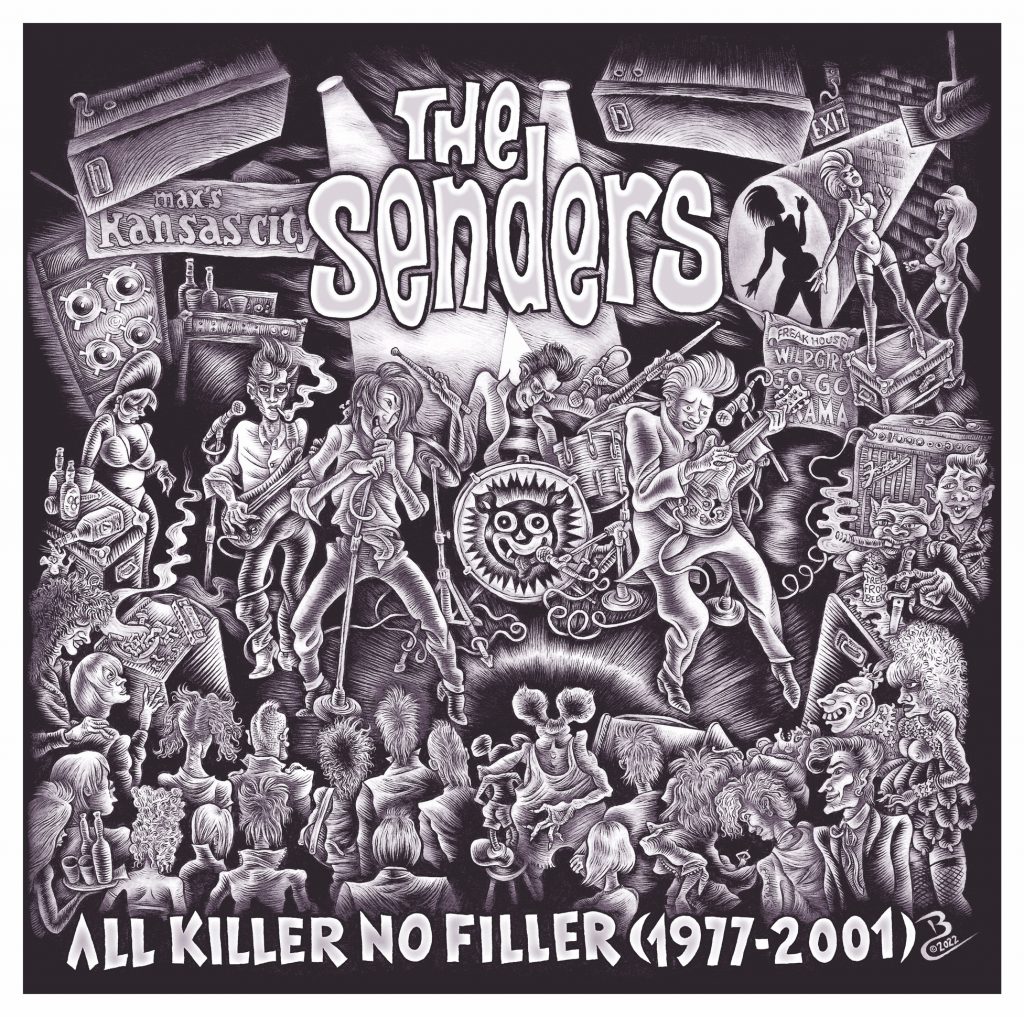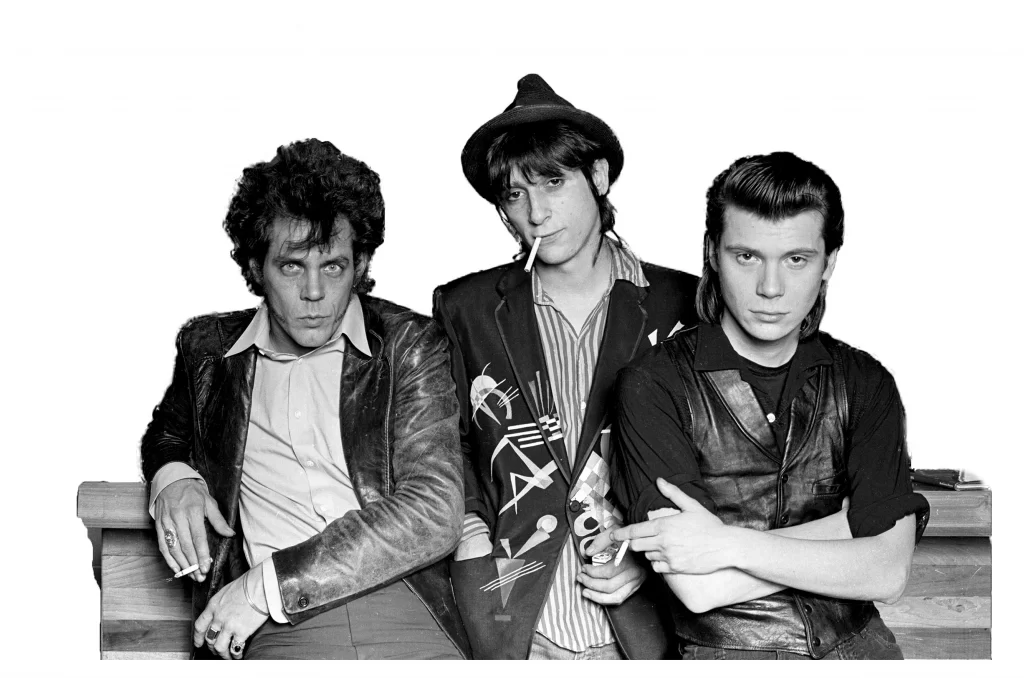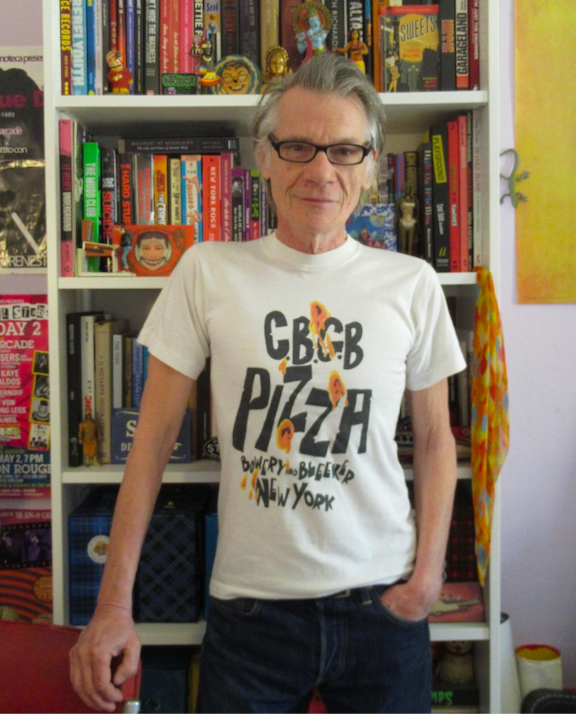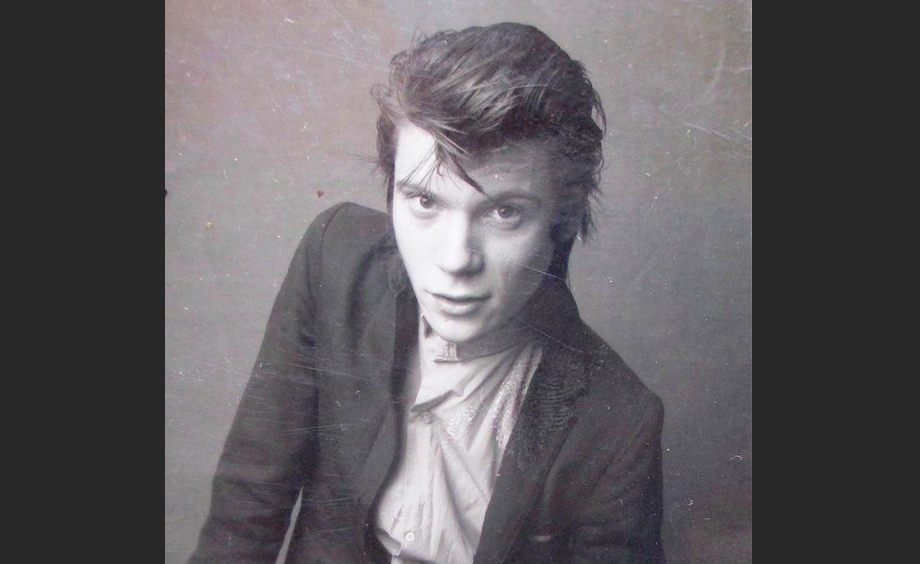“We didn’t try to be punk; we tried not to be, but fell miserably!” I guess you could say the combination of the blues and punk The Senders crafted so consummately was a happy accident. French frontman Phil Marcade and his band were just trying to play blues-based songs as well as they could, and damn if they just couldn’t help but play the way they did.
The jumpin’ rockabilly energy they infuse into songs like Howlin Wolf’s standard “The Killing Floor” and Fats Domino’s “I’m Gonna Be A Wheel Someday” rings loud and clear on a special new album. Left For Dead Records has announced the release of the first definitive collection of the rollicking, recorded legacy of the New York City’s Rock ‘n’ Rollers. All Killer No Filler (1977-2001) is being issued November 18 as 2 x 12” vinyl LP featuring over two dozen tracks in a gatefold sleeve, a 2 x CD also in a gatefold sleeve and with four additional bonus tracks. The packaging includes separate liner notes by music journalists James “The Hound” Marshall and Tim Stegall as well as Peter Crowley.

“We did love the craziness of those late ‘50s and early ‘60s Rhythm & Blues records and thought they were more ‘punk’ than punk itself,” Marcade continues. “We also loved the craziness of some rockabilly records. We loved Gene Vincent, Jerry Lee Lewis and all of them, so, naturally, that was a big influence too. Most of all, we loved early Rock & Roll, people like Ike Turner’s Kings Of Rhythm, Little Richard or Don & Dewey, to name a few. We were also mad for obscure records like The Cherokee Dance by Bob Landers with Willie Joe & his Untitar or all the records by André Williams. Stuff like that. We thought these records had an edge like no other record since.”
The Senders indubitably captured that exciting, reckless edge – the kind that comes from the distorted sound of a harmonica played with a Green Bullet mic through a Fender Twin Reverb amp. “We were huge fans of Little Walter,” he sharply notes.
Marcade grew up in Paris and entered the States in 1972 at the age of 17. What was supposed to be a two-month stint lasted 40 years. He first lived in Boston, then moved to New York in 1975, after some friends threw him a “Welcome to New York” party at their loft on West Broadway. The Ramones played that party, their third gig. “That whole scene seemed very exciting, so I moved there soon after. In the beginning, I stayed at the Chelsea Hotel. By chance, I had stumbled onto a little bar on 23rd street called Mother’s. The first night I went there I saw Mink DeVille. The second night I saw Blondie, then The Heartbreakers and all the original punk bands. Peter Crowley was the guy booking all the bands at Mother’s. He moved to Max’s Kansas City on Park Avenue South around the same time as CBGB started to happen on the Bowery.” Peter, of course, was also the guy who produced the Senders’ 1980 EP The Senders Seven Song Super Single, material which is included in this collection.
These tracks transport the listener back to another world, to ground zero for the New York punk scene in the 1970s, at a time when the scene was very small and everybody knew everybody else. Marcade first met Johnny in Boston after a New York Dolls show in ‘74 and ended up working as a roadie for The Heartbreakers for a while in 1975. “Me and my roommate, Bruce, ended up at a party in the hotel where the New York Dolls were staying. There, we played a game of dice with Johnny and, for some reason I don’t remember, started a whole conversation about spaghetti and how to make the ‘real’ Italian tomato sauce. Bruce invited Johnny over to our place for his spaghetti with ‘authentic’ tomato sauce. Much to our surprise, Johnny and his girlfriend Sable came over for the promised dinner. After that, we were like family!”
Marcade also became good friends with all the members of Blondie and, indeed, Debbie Harry asked him to help her with the French lyrics for “Denis.” In ‘76, Johnny Thunders introduced him to one of his best friends, Steve Shevlin, who played bass and with whom he started the Senders. “At first, I was the drummer, then, after a few months, I became the lead singer and we hired another drummer. I had never imagined I would end up singing in a professional rock band, much less in America. What a dream!”

His memories of Johnny run deep, such as the time he first played “You Can’t Put Your Arms Around A Memory.” Johnny played for Marcade what would go on to be his signature song, at his mom’s house in Queens after a Thanksgiving lunch. “I was floored by how great it was. I asked him where he got that line ‘You can’t put your arms around a memory.’ He told me he had heard it on The Honeymooners, the 1950s tv sitcom with Jackie Gleason and Art Carney. In one episode, Jackie Gleason tells his wife Alice, ‘If you don’t give me the money, I’m walking out that door and once I walk out of that door I’ll never set foot in this house again. You’re gonna be awful lonely here all by yourself, Alice, and remember: You can’t put your arms around a memory,’ to which she snaps right back at her fat husband ‘I can’t even put my arms around you!’ Another vivid memory is when Johnny called me on the phone to ask me to play drums in his new band Gang War, with Wayne Kramer from MC5. In the blink of an eye, I found myself in Ann Arbor, Michigan, recording demos with these two heroes of mine. It was fantastic!”
In his memoir Punk Avenue, Marcade reflected, “I loved Gang War, and I was certainly tempted to take them up on their offer to be their full-time drummer, but I couldn’t leave my beloved Senders. I also told myself that with Johnny on board, that band might not last very long. What a strange idea… So I went back to New York to continue my life as a Sender, but I was overjoyed to have had the chance to participate in those sessions in Ann Arbor.”
And it should be said that there was a song that Johnny loved of Marcade’s: a classic called “The Living End,” one of the first songs he ever wrote. “We had recorded that one (without Johnny) for our first and only 45 that came out in ‘78. It’s on All Killer No Filler, too. I was told that Johnny often played that song live in Europe, that year. That’s the nicest compliment ever. I was thrilled to find out that Johnny Thunders covered one of my songs.”
The Senders only recorded live stuff with Johnny Thunders when they played five gigs with him as their guitar player in ‘78. “Our original guitar player had just quit and, as we looked for a new one, Johnny came up with the idea that we play a few gigs together just for fun (and to make some money) while we looked for a replacement. He wanted to be ‘only the guitar player’ and play nothing but Senders songs. Some of those shows were recorded and one of them is on All Killer No Filler. The whole set! It’s wild! It’s the first time this is released on record. Right after we did these gigs with Johnny, we met Wild Bill Thompson, who was already a bit of a blues guitar legend in his home turf of Long Island. When Bill joined the Senders in ‘78, we really took off.”
Bill stayed in the band until The Senders’ last gig in 2001. After being active for 25 years in his band, Marcade left the city in 2012. “I worked as a French/English translator for ten years. My rent was getting ridiculously expensive and I just couldn’t make ends meet anymore. Anyway, most of my good pals had left town already, or had left the planet altogether. It was time for a change.” When he went back to promote his book Punk Avenue, the city was different. Very different. “The Lower East Side had changed so much in just five years since I had left town. What a drag! I leave for five minutes and see what happens! It was all luxury hotels and $3000 a month apartments. Art galleries and sushi restaurants had replaced the dope houses and rundown tenements in Alphabet City. All the ‘cool kids,’ rock musicians, and artists had moved to Brooklyn. The Manhattan Rock & Roll scene had vanished and all of the great clubs had closed. I was happy to discover some keepers of the flame, though. Younger bands like Daddy Long Legs, who I really dig.”

Marcade currently resides in Bologna, where somehow the kids in that big college town conjure up memories of the New York kids of the late ‘70s. I asked him if he has seen evidence of roll and roll being alive and well. “Oh yes, there’s a big rock & roll scene in Italy. I was astonished when I first went to a yearly rockabilly convention here called The Motorcycle Gang Jamboree. There were hundreds of Italian rockers, greasers and Teddy Boys, all dressed up in ‘drapes’ and with amazing pompadour hair-dos and sideburns.
“They’re mad for vintage American rock & roll here, and take it very seriously. My girlfriend, Eva, is from here and I was also surprised to find out that most of her friends knew more about the ‘70s New York Punk Scene than I do! My book Punk Avenue was published in Italy in 2010 and did very well, here.We went to a Andre Williams concert, here, a few years ago. It was packed and they were going nuts for him. They know good stuff and are real passionate about it.”
All Killer No Filler covers a lot of ground – from 1977-2001, from studios to dives, all previously unreleased or long out of print. Marcade hand-picked all 27 of the songs, making it the ultimate Senders compilation and, more so than anything the band put out before, showcases their rock and roll bona fides and captures the essence of an era. “I’m thrilled about the release of this collection. It really is ‘the best of the best’ of the Senders recordings, that’s why it’s called All Killer No Filler. I was very impressed by how much love Left For Dead Records put into this project. Their attention to detail was incredible. This will be a double vinyl album packaged in a gatefold sleeve with an amazing front cover illustration by Bruce Carleton. It will also come out as a two CD set, packaged in a cardboard gatefold sleeve, just like a mini LP cover.”
But perhaps most importantly, All Killer No Filler serves as a tribute to their late guitarist, Wild Bill Thompson, who passed away a few years ago. “He was a true disciple of Freddy King, Ike Turner, Hubert Sumlin and all the pioneers of Rhythm & Blues electric guitar. This compilation includes all of Bill’s best and craziest guitar solos. I hope listeners will get as much happiness out of this collection as we got recording those songs through the years. Because, yes, we never got rich, but boy, did we have fun!” Marcade exhorts, “This will definitely be a collector’s item, released only in a limited number, so grab a copy as soon as it comes out because they will probably go very fast. If you miss it, don’t come crying to me later. I warned you!”


